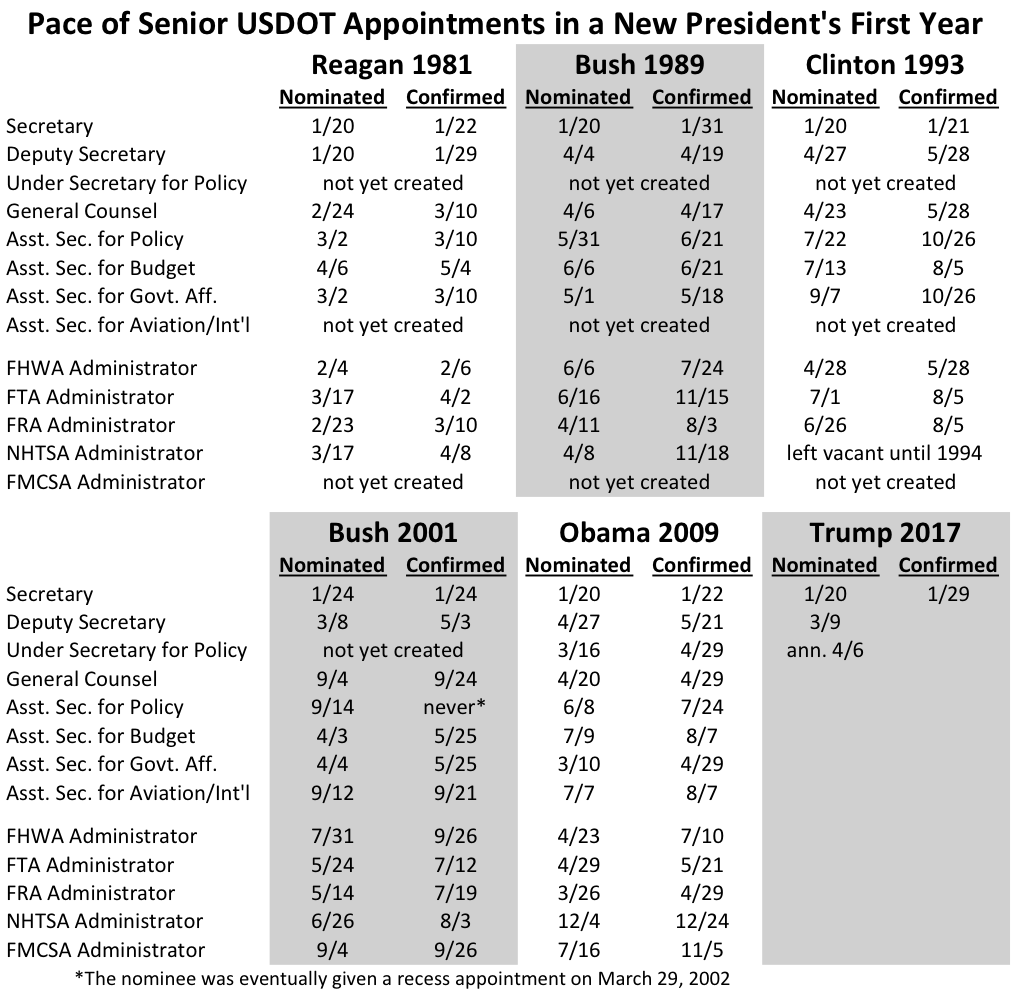April 7, 2017
The White House formally announced on April 6 that President Trump will nominate former Mitch McConnell staffer and current Lyft executive Derek Kan to be Under Secretary of Transportation for Policy. (ETW first reported on March 9 that Kan had the inside track for the “S-3” job.)
Kan is currently the Los Angeles-based general manager for Lyft and also serves as a member of the Amtrak Board of Directors, having been nominated by President Obama in July 2015 and confirmed by the Senate in December 2015 for a five-year term.
In other nomination news, the nominees for the number 2 jobs at the Department of Transportation and the Department of Homeland Security each took a step forward this week, but the transportation nominee may face a rockier road.
The full U.S. Senate confirmed Elaine Duke to be Deputy Secretary of Homeland Security on April 4 by a vote of 85 to 14. And the Senate Commerce, Science and Transportation Committee voted on April 5 to recommend that the Senate confirm Jeff Rosen to be Deputy Secretary of Transportation – but that vote was a party-line 15 to 12, with every Democrat on the panel voting “no” on the nomination.
The votes against Rosen in committee appear to be a reaction largely to President Trump’s proposed FY 2017 budget revisions and FY 2018 initial budget outline, which propose to kill the popular TIGER grant program and the Essential Air Service subsidy program, stop any new subway and light rail systems or extensions from getting any federal funding, and kill Amtrak’s long-distance passenger routes.
At his confirmation hearing on March 29, Rosen was in a difficult spot. On one hand, he was peppered with questions from Senators about the White House’s announced plans to kill these programs (which are very popular with Senators on a bipartisan basis), which may or not be replaced to some degree with new programs in an infrastructure initiative that may or may not be released this spring or summer or fall.
On the other hand, Rosen was operating under crystal-clear instructions from the White House (see this OMB Memorandum dated March 17), telling all Administration officials “it is critically important that you not make commitments about specific programs if they are not expressly mentioned in the Budget Blueprint. Similarly, you should not address account-level details… defer any questions related to the full Budget until after the Budget is released.”
So Rosen, naturally, did not have much to say to the committee.
At this week’s markup, Sen. Cory Booker (D-NJ) called Rosen a good public servant but expressed his “extreme frustration” that he could not commit to supporting programs with bipartisan support like the mass transit new start program. (News flash: Booker is really anxious to get the Trans-Hudson Gateway project funded and under construction.)
And Sen. Richard Blumenthal (D-CT) said that Rosen’s responses to his questions at the hearing showed a disturbing lack of familiarity with many transportation programs. He said that he hoped the unified Democratic solidarity in voting against him would prompt him to be more responsive to the committee.
Full committee ranking minority member Bill Nelson (D-FL) tied it all into the Big Question regarding infrastructure: “everybody gives lip service to improving our infrastructure, but they don’t want to pay for it.”
It is unclear when the Rosen nomination will hit the Senate floor. It is proving difficult to get Senate votes on sub-Cabinet appointees without going through the cumbersome cloture process.
It is also important to remember that while the pace of Trump Administration nominations feels slow (especially in this age of the 24-hour news cycle and social media a.k.a. Short Attention Span Theater), as far as transportation nominations go, President Trump is not yet running behind the pace set by George H.W. Bush, Bill Clinton, George W. Bush, and Barack Obama (see table below).





